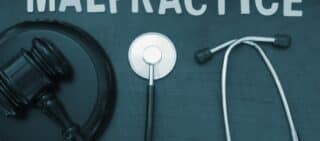
Background of Transvaginal Mesh Complications Transvaginal mesh is a net-like substance that’s inserted into a patient’s vaginal area to provide...

Suing for anesthesia errors involves filing the necessary legal documents and proving that anesthesiologist negligence led to your injury. Anesthesia errors frequently contribute to medical malpractice, accounting for many injuries and fatalities yearly. If you are a victim, you can sue for anesthesia errors and recover compensation for your losses.
If an anesthesia error caused you to suffer an injury or the wrongful death of your family member, you may be able to sue for financial compensation. You will need to initiate a medical malpractice claim against a negligent anesthesiologist to recover damages. In case of a wrongful death because of anesthesia-related complications, family members can sue on behalf of the decedent.
Anesthesia is meant to be a fairly harmless medical procedure. It causes a temporary loss of sensation, and sometimes awareness, that relieves surgical patients of their pain for the medical procedure. However, underdosing or overdosing on sedatives can cause serious complications, including irreparable brain damage, or even death.
Anesthesiologists must continuously monitor drug levels and the patient's vital signs during the medical procedure. If they fail to perform their role to the expected standards, and their patient suffers injuries or passes away because of their negligence, they are liable for a medical malpractice lawsuit.
If you intend to sue for anesthesia errors, a medical malpractice lawyer will be invaluable. Medical malpractice cases are notoriously complicated because they require testimony from medical experts who have extensive knowledge of medical procedures, thorough reviews of the patient's treatment plans and medical records, and an understanding of how the injuries will impact the victim's life in the future.
Various parties may be able to be held liable in a medical malpractice lawsuit that arises because of anesthesia errors. Defendants might include:
As the medical professional responsible for administering and monitoring anesthesia during a procedure, the anesthesiologist is usually the main respondent when filing a medical malpractice claim due to anesthetic errors. Often classified as independent contractors, anesthesiologists may have legal liability for your losses if they are not directly employed by the hospital or surgical center.
However, the case takes a different turn if the anesthesiologist is an employee of the hospital or medical facility.
Determining whether the anesthesiologist is answerable as an independent contractor or the hospital's employee is a complicated process. You will need evidence of documents like the employment contract between the person and the hospital. Additionally, it would help if you established the hospital's degree of control over the anesthesiologist's job conditions during the surgical operation.
The general rule of thumb is if the employer, in this case, the hospital or surgical center, had a considerable degree of control over the anesthesiologist, liability may shift to the employer.
The hospital typically bears responsibility for the medical malpractice committed by its staff. This is known as vicarious liability. If the anesthesiologist who harmed the patient is not an independent contractor, he or she is considered an employee of the hospital. In such cases, you may sue the hospital for anesthetic errors on behalf of its staff.
The hospital can be legally held responsible if the anesthesiologist’s employment contract shows he or she is under the hospital’s employment, as well as if negligence arose due to poorly maintained anesthetic equipment.
Even if the anesthesiologist is an independent contractor, you may still list the hospital as a liable party. Medical facilities have a legal duty to ensure that whoever they hire can perform the task up to the required medical standards. The hospital should also supervise its employees to eliminate possible medical errors.
When anesthetic errors occur due to medical equipment failure, the hospital may also be responsible for the negligence. Facilities have a duty to ensure the efficient functioning of their medical equipment to avoid facing claims for hospital malpractice.
To sue for anesthesia errors, you need to prove negligence on the part of the medical provider Your medical malpractice lawyer will guide you through how to sue for anesthesia errors and recover financial compensation for your injuries, pain, and suffering.
Suffering an adverse outcome is not enough to warrant a lawsuit for anesthesia errors. Your lawyer will need to prove that the medical provider was negligent and that the negligence caused you to suffer injuries.
In general, the term negligence is applicable when medical professionals breach their duty of care toward their patients. An anesthesiologist is negligent when he or she fails to meet the standard of care expected when treating the patient. The standard of care is what another anesthesiologist of similar qualifications would have done under a similar situation, given the same equipment and resources.
To prove negligence, your medical malpractice attorney hire a qualified anesthesiologist. He or she can testify in court after reviewing the patient's medical records and identifying mistakes that were made during the procedure.
When you sue for anesthesia errors, you need to prove the following elements of medical malpractice:
This element is the easiest to prove, since it is generally established when the defendant agrees to treat you. Your medical malpractice lawyer will need to prove that a provider-patient relationship existed between you and the defendant when the errors occurred.
To prove negligence, you need to show that the medical provider, in this case, the anesthesiologist, was negligent when providing medical care to the patient before, during, or after the operation. He or she must have acted in a contrary manner to how another healthcare provider reasonably would have.
After successfully establishing negligence, your attorney will need to link the errors to your injuries. It is not sufficient to show that anesthesia errors occurred. They must have been responsible for causing your injuries.
Finally, your medical malpractice lawyer will need to prove the damages you or a loved one sustained due to the anesthesia errors. You may be able to claim several types of damages. These include:
If someone dies because of anesthesia errors, the family of the deceased can also sue for the losses they suffered because of the wrongful death. It is also possible to recover punitive damages if the anesthetic errors were intentional or extremely outrageous.
A Springfield medical malpractice attorney can review your case to help determine whether you have grounds to sue for anesthesia errors. Illinois laws do not limit how much compensation victims of medical malpractice, including anesthetic errors, can recover through a medical malpractice lawsuit.
Every state has a statute that limits the time victims have to sue for medical malpractice. For Illinois residents, you generally only have two years from when the anesthesia error occurred or from when you discovered the mistakes. If you fail to take legal action before the time limit expires, you will likely lose your right to recover compensation for your losses.
It is normal for the dates of occurrence and discovery to differ. For instance, if the defendant left a foreign object in the victim's body, it may take a couple of months or even a year for the patient to feel the effects. In such instances, the victim should file a medical malpractice case within 24 months from the discovery date. However, the effects of anesthetic errors often show rather quickly, with some causing death during even a routine procedure.
Illinois laws prohibit adult victims from instituting legal actions against the offender if they fail to do so within four years from the date of occurrence, despite the discovery date.
The only exceptions to the two years stipulated within the statute of limitations are cases where the victim is under the legal age of 18. The injured minors in Illinois should sue for anesthesia errors or other medical malpractice within eight years of the occurrence. However, the injured under-age victim loses their claim to compensation if he or she fails to file a claim before the age of 22, no matter the date of discovery.

Background of Transvaginal Mesh Complications Transvaginal mesh is a net-like substance that’s inserted into a patient’s vaginal area to provide...

What Are the Responsibilities of a Radiologist? Radiologists are medical doctors who perform diagnostic testing procedures and radiology procedures on...

What Are the Types of Damages in Medical Malpractice Cases? Compensatory and punitive damages are the two main types of...